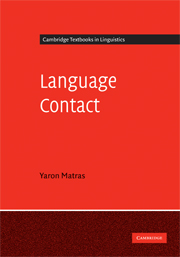Book contents
- Frontmatter
- Contents
- List of figures
- Preface
- List of abbreviations
- 1 Introduction
- 2 An emerging multilingual repertoire
- 3 Societal multilingualism
- 4 Acquiring and maintaining a bilingual repertoire
- 5 Crossing the boundaries: codeswitching in conversation
- 6 The replication of linguistic ‘matter’
- 7 Lexical borrowing
- 8 Grammatical and phonological borrowing
- 9 Converging structures: pattern replication
- 10 Contact languages
- 11 Outlook
- Notes
- References
- Author index
- Language index
- Subject index
7 - Lexical borrowing
Published online by Cambridge University Press: 05 June 2012
- Frontmatter
- Contents
- List of figures
- Preface
- List of abbreviations
- 1 Introduction
- 2 An emerging multilingual repertoire
- 3 Societal multilingualism
- 4 Acquiring and maintaining a bilingual repertoire
- 5 Crossing the boundaries: codeswitching in conversation
- 6 The replication of linguistic ‘matter’
- 7 Lexical borrowing
- 8 Grammatical and phonological borrowing
- 9 Converging structures: pattern replication
- 10 Contact languages
- 11 Outlook
- Notes
- References
- Author index
- Language index
- Subject index
Summary
Content words and the position of nouns
It is often assumed that there is a core vocabulary that is to some extent at least resistant to borrowing. This assumption is yet to be verified empirically on the basis of a systematic analysis of a cross-linguistic sample. It is perhaps most closely associated with the name of Morris Swadesh, whose list of 207 items of supposed basic vocabulary has been widely used by linguists as the basis for the so-called ‘lexico-statistic’ method (see Swadesh 1952). This method in turn has formed the foundation for comparisons among languages and often for the postulation of language families and sub-families, as well as for calculations of the time depth of splits into sub-groups – a procedure referred to as ‘glottochronology’.
At the heart of Swadesh's list is the prediction that some concepts are ‘generic’, in the sense that they represent objects or ideas that accompany human beings independently of their specific environment. Names of body-parts, close kin, body-related activities, pronouns, interrogatives, and basic concepts for nature and geography have all been considered a part of this generic lexical inventory. Since these concepts exist, according to the assumption, in every human community, there would be no need to borrow the relevant labels from languages of neighbouring communities.
- Type
- Chapter
- Information
- Language Contact , pp. 166 - 192Publisher: Cambridge University PressPrint publication year: 2009



